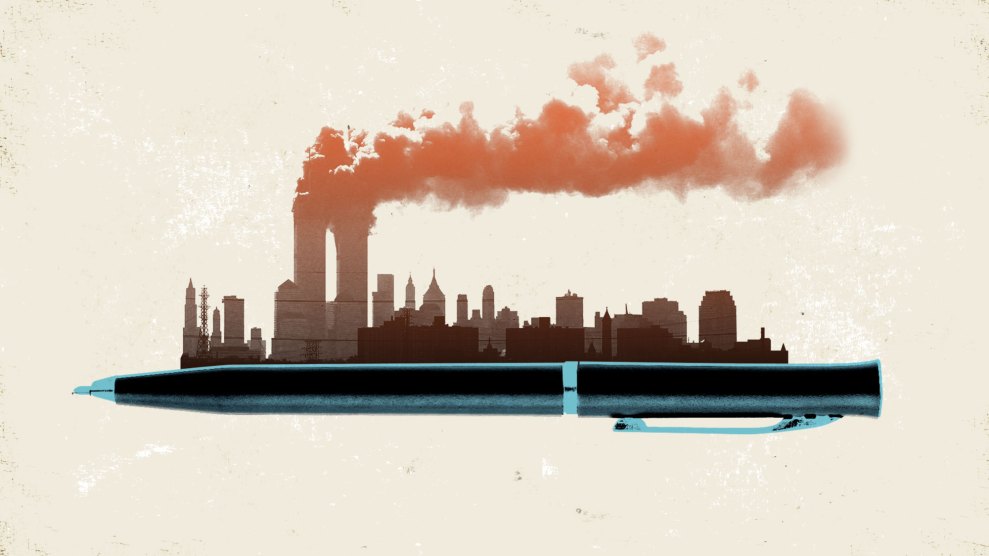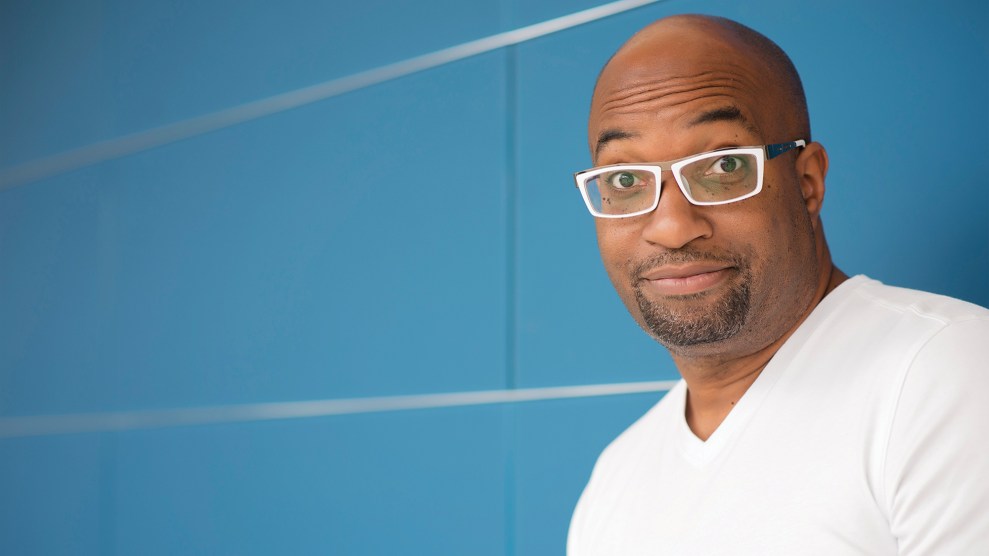
Mother Jones illustration
I first met Lawrence Joseph in Detroit in 1980 when he was a law professor at the University of Detroit and I was a student at his alma mater, the University of Michigan. He was intense and brilliant, and although his profession may have been law, his true identity was that of a poet—whose first book, Shouting at No One, was soon to come out.
Joseph has published a nonfiction novel, Lawyerland, a collection of essays, and five additional poetry books since then. The latest, So Where Are We?, resonates with some of the same themes that preoccupied him back then: a United States in crisis, inequities of the corporate state, the collapse of his hometown (Detroit), xenophobia, love, exile, unspeakable violence, religion, and rage. So Where Are We? has been described as “that rare collection of poetry that terrifies and sustains.”
Born in Detroit, his parents the children of Lebanese and Syrian Catholic immigrants, Joseph won prizes for his poetry as an undergraduate and received a prestigious fellowship to attend Cambridge University for two years. He returned to Ann Arbor to attend law school. Going into law seemed like a practical way to address the injustices that preoccupied him, and he was nothing if not a realist about the financial prospects of a professional poet. He now teaches at St. John’s University School of Law, in New York, where he and his wife, the painter Nancy Van Goethem, have lived since 1981.
While his latest book was finished before Donald Trump was elected, Joseph’s work has the quality of all great poets; it’s very particular and yet it speaks to greater emotional truths. In “Back to That,” he writes, “What we felt—something taken from us/we’ll never get back—disarticulated,/no language for it, inwardly unstrung.”
Given America’s political turmoil, I decided to check in with Joseph to talk about his work and, as it were, where we are.
Mother Jones: You said once that you’ve “always believed that poetry must speak of realities as least as complicated as those spoken of in prose.” How are those realities communicated differently when you speak about them in poetry?
Lawrence Joseph: External realities—worlds of politics, economics, law, war, interpersonal and social relations—are part of prose fiction. Fiction also includes the realities of a character’s interior language. Poetry can encompass the same realities, but in compressed, intensified language, which creates entirely different degrees of emotional force.
MJ: This question of “realities” is a recurring theme in your work. You observed that “the realities of the times in which the poet lives and writes constantly transform a poem’s aesthetic space.” How was your aesthetic space transformed when you moved to New York from Detroit?
LJ: The Detroit that I was born in, in 1948, represented the entire structure of a mass production industrial society. By the 1920s, Detroit was one of the most famous cities in the world, a fame born of Henry Ford’s production of automobiles on a mass scale. Ford’s genius for collectivizing production—what Antonio Gramsci called “Fordism”—radically changed labor and consumer markets, and capitalism itself. Especially since the insurrection in 1967—known as the “riots”—Detroit has been an international codeword for class and racial conflict. In 1974, at the beginning of the international oil wars, Detroit’s economy collapsed into an economic depression that has really yet to end. That was the Detroit in which my wife and I lived during the ’70s —the years that I wrote the poems in my first book. The New York City we moved to in 1981 was—and, of course, still is—the world center of finance capital, which has globally morphed into what I refer to in So Where Are We? as “technocapital.” My books since Shouting at No One have not only included Detroit’s ever-changing realities, but have also taken in New York City’s changing realities—including 9/11—as well.
MJ: So Where Are We? spans the years since 9/11 transformed our country. You were in New York City when the attacks occurred. What were the facts of your living situation then?
LJ: My wife and I lived, and still live, a block from Ground Zero. I left her on the morning of September 11 to go out by subway to Queens, where I teach at St. John’s University School of Law. I learned about the first plane going into the World Trade Center’s tower when I arrived at work. I called my wife at the apartment—she was there, and knew that the tower had been hit by a plane, but no more than that. I called again after the second tower was attacked, but the line was dead. We can’t see the World Trade Center from our apartment, which faces west and south. My wife spent that day and night, into the morning, alone, in our apartment, cut off from all communication and sources of information, believing there had been a chemical warfare attack. It was more than 24 hours before I saw her again, when I was able to get to our apartment on the morning of the 12th. We were then evacuated from our apartment for over two months. I directly revisit that day and that time in the poem “That September and October” in So Where Are We?
MJ: At what point did you began to turn those facts and your emotional state, even trauma, into poetry? Was there an image that captured you and led you along? Was writing after that catastrophe, about that catastrophe, different from your previous work?
LJ: I couldn’t and didn’t want to write about it at first, not in poetry. It took years before I could assimilate the ’67 Detroit rebellion and the effect that it had on me; it so radically upended my sense of the world, and I knew that this, too, would take time to imaginatively absorb. I’m a compulsive note-taker, and, once my wife and I were together and safe, I began to compile notes on it. Of course, I would incorporate my experience into my poetry—from the beginning of my work I had written about violence, and violence was at the core of what we now metaphorically refer to as “9/11.” No, there wasn’t a single image that triggered my imagination—our experience was too direct, too overwhelming. There were endless images, recollections, thoughts, feelings, that needed to be sorted out.
MJ: The poem “So Where Are We?” seems to emerge so organically from that event, the “falling, flailing bodies in midair” and yet it is so much more. Could you talk about the “realities” you were grappling with there?
LJ: The poem begins with the question “So where were we?” going back to where Into It, my prior book of poems, left off, in the aftermath of the horrors of our post-9/11 world, the massive violence unleashed by the American invasion of Iraq, inexorably tied to a systemic, militarized corporatism. Halfway through the poem, I symmetrically end a line, “So where are we?”—the question every poem in the book addresses. It is a world in which, as I say in the book’s opening poem “A Fable”: “The flow of data/since the attacks has surged,” where technocapital is “permanently, digitally,/semioticized, virtually unlimited/in freedom and power, taking/billions on the planet/with it,” a world of “ravenous cruelty, viciousness, annihilation… defended and worshipped.”
MJ: You are Arab American, a lawyer, a Catholic, and someone who lived most of your life in Detroit and New York City—your poetry is filled with those identities. There is so much to explore in all of that, but a recurring theme is one of power. Power abused, power debased, terrible social inequities. There is rage in your poems but also these moments of grace and beauty. How do you work with all these elements?
LJ: I certainly feel rage about the grotesquely abusive economic, even criminal, effects of political power on wealth distribution and individual rights in America, but in the poems, these issues are presented more as expressions of moral indignation. The grace, beauty, and love in the poems are expressions of what are, for me, fundamental truths. How I work all these elements together in a poem is an issue of form, of composition. I compose the poems carefully, over time—they go through countless drafts, changes, taking their final shape in the process. I don’t feel the multiple identities crowding out one another—the presence of one or another identity in a poem depends on the particular poem.
MJ: In Shouting at No One first, you wrote about the intensity of growing up in Detroit. Tell me more about that.
LJ: My grandparents, Lebanese and Syrian Catholics, emigrated to the United States, to Detroit, before World War I. My mother and father were born in Detroit after the war ended. My grandparents on both sides were grocers. They spoke and read and wrote Arabic. They also learned to speak English quickly and proficiently. My parents were educated in Catholic grade and high schools, as I was. My father and his brother inherited their father’s grocery store, which became a grocery-party-liquor store in what was one of Detroit’s most violent neighborhoods in the 1950s and ’60s. By 1960, the store could no longer support two families, so my father went to work as a meat-cutter for A&P, also helping my uncle out at the store three nights a week. Economically, my family was, you might say, downwardly mobile, my father having gone from the co-owner of a failing small business to working class. My father retired from A&P a proud, decades-long member of the meat-cutters union. During the ’67 rebellion, the store was looted and burned. Three years later, my father was shot, but not killed, in a robbery. Issues of political economy have always been intensely present for me.
MJ: How has the current political climate affected your work?
LJ: So Where Are We? was finished before the election a year ago. The issues the poems address—political economy, labor and capital, racism, war—have since then been exponentially compounded. There is something similar about it and 9/11 for me—the terrible feeling of a collective turn for the worse.
MJ: What special responsibilities do poets have during this time in American history?
LJ: The responsibilities are no different than the responsibilities of anyone who identifies in some way as an American who believes in a socially democratic, civil state. Countless lawyers—among them many of my former students—are actively fighting against the political, economic, and environmental horrors, and the horrendous assault on civil rights we face now on every social level. I write out of a tradition of poetry that confronts the social realities of the time in which a poet lives, issues of political economy that affect all of us, collectively, in one way or other. Poems, for me, are acts of resistance—resistance to the violence systematically rooted in a militarized, corporate-statist, anarcho-capitalist politics. For me, as a lawyer and a law professor, these realities are constituted by law. The language of law, which I know, is a language of power, money and violence, and I employ it, for my purposes, alongside the other kinds of language in my work.
MJ: How would you answer the question you pose: Where are we?
LJ: If by “we” you mean Americans, where we are, collectively, is in a state of substantial violent and humanly destructive political chaos. And, forcefully being pushed back against it are acts of resistance grounded on the deepest human aspirations, justice and love.
Image Credit: Gene Boyars/AP; Chimpinski/Getty; photoillustration by Adam Vierya
















